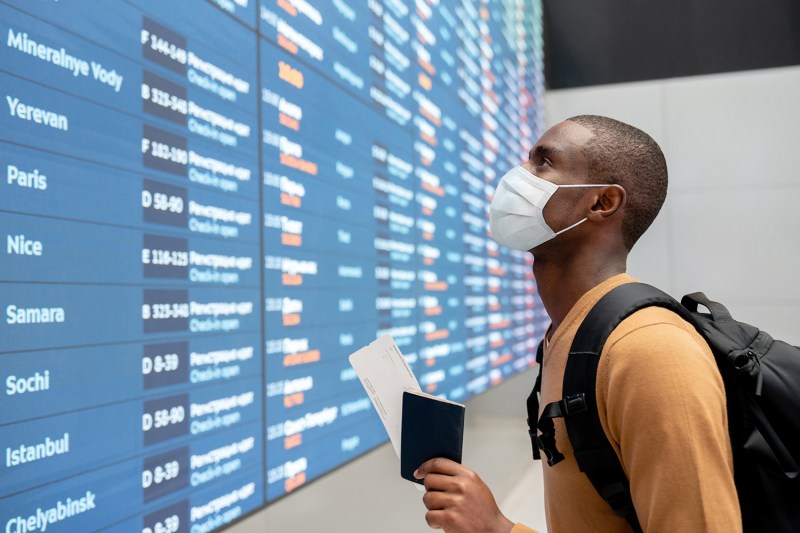
Like our favorite suits and local restaurants, 13-odd months of avoiding domestic and international travel has finally reached a breaking point. After not seeing anything more exotic than Netflix and the produce aisle, we’ve grown delirious with longing. We can hear the flutter of Japan’s cherry blossoms. We can envision the Dutch tulips. Well, good news, all of you who have developed an acute case of cabin fever: On April 2, the U.S. Centers for Disease Control and Prevention (CDC) updated its guidelines for both domestic and international travel for fully vaccinated adults. Translation: anchors away.
Related Guides
- Countries Vaccinated Americans Can Travel To Right Now
- Should You Travel After Getting a COVID-19 Vaccine?
- Future of Post-Pandemic Restaurants
“People who are fully vaccinated with an FDA-authorized vaccine can travel safely within the United States,” the CDC writes. Period. Full stop. And while its international recommendations page included a much less encouraging statement, it has nevertheless updated its guidelines to reflect the lower risk of fully vaccinated individuals, albeit with the caveat of some potential risk from emerging COVID-19 variants, the United Kingdom strain being named specifically. “Even fully vaccinated travelers need to pay close attention to the situation at their destination before traveling,” it cautions. (And for good reason: A quick survey of its worldwide COVID map shows that unless you’re visiting Greenland, the world is still awash with coronavirus.)
So what does that mean for you, the man who, over the last calendar year, has intimately come to know every nook and cranny of his dwelling? Well, if you’re two weeks past your second of two shots or two weeks past your single-dose shot, you’re ready to roll. But, if you’re like many Americans, you’ve already booked travel prior to the CDC’s updated guidelines.

According to Trivago, a hotel-booking site, American interest was accelerating well before the CDC update, with March alone seeing a record 27% month-over-month clickout jump, which is a metric used to garner earnestness in booking reservations. This hews closely to 2021’s trend for the company, which has recorded double-digit growth since the beginning of the year as more and more Americans feel the travel bug. Just how bad is the itch? A survey the company conducted in January 2021 found that two-fifths of 2,000 individuals polled in the U.S. and U.K. claimed they’d go so far as to give up sex for a year to travel immediately.
“Many Americans are craving safe, warm-weather getaways, and beach destinations have been the number one choice for travelers as the country reopens,” Trivago CEO Axel Hefer tells The Manual. “Our recent consumer travel survey found that nearly a fourth of U.S. travelers’ idea of a ‘dream vacation’ post-pandemic is being on a tropical island. With the vaccine rollout in Q1, we saw an uptick in travel and searches, especially to tropical regions open and easily accessible to Americans, like parts of Mexico and the Dominican Republic.”
Of course, whether you’re roaming within the U.S. or on a beach outside its borders, the CDC still recommends a number of measures out of an abundance of caution. Vaccinated domestic travelers are advised to wear face masks, avoid crowds, maintain a six-foot distance from people not traveling with you, frequently wash your hands, and monitor for COVID symptoms post-travel. (If you do develop COVID-like symptoms, get a test and quarantine while you wait for the results.) International travel carries with it the need for all the precautions of domestic travel with the increased recommendation of a post-travel test regardless of vaccination status.
But before you go jetting off to Paris for a long weekend, note that all persons entering the U.S., regardless of citizenship or vaccination status, must show proof of a negative COVID test no more than three days before travel. Alternately, you may show proof of “recovery from COVID-19 in the past 3 months.” While this may sound like an incredible pain in the ass, if you were prepared to give up lovemaking for a year, we’re guessing this requirement is much easier to achieve (and document).
So if you’re one of a growing number of Americans who have been fully vaccinated, it’s time to get out and travel. Of course, wear a mask. Wash your hands. Avoid industrial raves unless there is good ventilation and a healthy amount of space between neon-clad attendees. While the floodgates are far from flung wide for sick-of-home Americans looking to go abroad or just the next town over, the CDC has given, if not a green flag, at least the yellow one. As such, proceed with caution, but proceed nevertheless.



